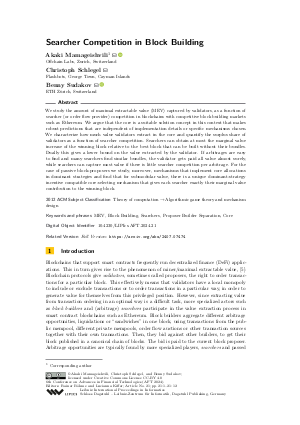Searcher Competition in Block Building
Authors
Akaki Mamageishvili  ,
Christoph Schlegel,
Benny Sudakov
,
Christoph Schlegel,
Benny Sudakov 
-
Part of:
Volume:
6th Conference on Advances in Financial Technologies (AFT 2024)
Part of: Series: Leibniz International Proceedings in Informatics (LIPIcs)
Part of: Conference: Advances in Financial Technologies (AFT) - License:
 Creative Commons Attribution 4.0 International license
Creative Commons Attribution 4.0 International license
- Publication Date: 2024-09-16
File

PDF
LIPIcs.AFT.2024.21.pdf
- Filesize: 0.68 MB
- 12 pages
Document Identifiers
Related Versions
- Full Version https://arxiv.org/abs/2407.07474
Subject Classification
ACM Subject Classification
- Theory of computation → Algorithmic game theory and mechanism design
Keywords
- MEV
- Block Building
- Searchers
- Proposer Builder Separation
- Core
Metrics
- Access Statistics
-
Total Accesses (updated on a weekly basis)
0PDF Downloads0Metadata Views
Abstract
We study the amount of maximal extractable value (MEV) captured by validators, as a function of searcher (or order flow provider) competition in blockchains with competitive block building markets such as Ethereum. We argue that the core is a suitable solution concept in this context that makes robust predictions that are independent of implementation details or specific mechanisms chosen. We characterize how much value validators extract in the core and quantify the surplus share of validators as a function of searcher competition. Searchers can obtain at most the marginal value increase of the winning block relative to the best block that can be built without their bundles. Dually this gives a lower bound on the value extracted by the validator. If arbitrages are easy to find and many searchers find similar bundles, the validator gets paid all value almost surely, while searchers can capture most value if there is little searcher competition per arbitrage. For the case of passive block-proposers we study, moreover, mechanisms that implement core allocations in dominant strategies and find that for submodular value, there is a unique dominant-strategy incentive compatible core-selecting mechanism that gives each searcher exactly their marginal value contribution to the winning block.
Cite As Get BibTex
Akaki Mamageishvili, Christoph Schlegel, and Benny Sudakov. Searcher Competition in Block Building. In 6th Conference on Advances in Financial Technologies (AFT 2024). Leibniz International Proceedings in Informatics (LIPIcs), Volume 316, pp. 21:1-21:12, Schloss Dagstuhl – Leibniz-Zentrum für Informatik (2024)
https://doi.org/10.4230/LIPIcs.AFT.2024.21
BibTex
@InProceedings{mamageishvili_et_al:LIPIcs.AFT.2024.21,
author = {Mamageishvili, Akaki and Schlegel, Christoph and Sudakov, Benny},
title = {{Searcher Competition in Block Building}},
booktitle = {6th Conference on Advances in Financial Technologies (AFT 2024)},
pages = {21:1--21:12},
series = {Leibniz International Proceedings in Informatics (LIPIcs)},
ISBN = {978-3-95977-345-4},
ISSN = {1868-8969},
year = {2024},
volume = {316},
editor = {B\"{o}hme, Rainer and Kiffer, Lucianna},
publisher = {Schloss Dagstuhl -- Leibniz-Zentrum f{\"u}r Informatik},
address = {Dagstuhl, Germany},
URL = {https://drops.dagstuhl.de/entities/document/10.4230/LIPIcs.AFT.2024.21},
URN = {urn:nbn:de:0030-drops-209579},
doi = {10.4230/LIPIcs.AFT.2024.21},
annote = {Keywords: MEV, Block Building, Searchers, Proposer Builder Separation, Core}
}
Author Details
References
- Maryam Bahrani, Pranav Garimidi, and Tim Roughgarden. Centralization in block building and proposer-builder separation. CoRR, abs/2401.12120, 2024. URL: https://doi.org/10.48550/arXiv.2401.12120.
-
Maryam Bahrani, Pranav Garimidi, and Tim Roughgarden. Transaction fee mechanism design in a post-mev world. Cryptology ePrint Archive, 2024.

- Pedro Braga, Georgios Chionas, Piotr Krysta, Stefanos Leonardos, Georgios Piliouras, and Carmine Ventre. Who gets the maximal extractable value? A dynamic sharing blockchain mechanism. In Mehdi Dastani, Jaime Simão Sichman, Natasha Alechina, and Virginia Dignum, editors, Proceedings of the 23rd International Conference on Autonomous Agents and Multiagent Systems, AAMAS 2024, Auckland, New Zealand, May 6-10, 2024, pages 2171-2173. ACM, 2024. URL: https://doi.org/10.5555/3635637.3663097.
-
Agostino Capponi, Ruizhe Jia, and Sveinn Olafsson. Proposer-builder separation, payment for order flows, and centralization in blockchain. Payment for Order Flows, and Centralization in Blockchain (February 12, 2024), 2024.

- Philip Daian, Steven Goldfeder, Tyler Kell, Yunqi Li, Xueyuan Zhao, Iddo Bentov, Lorenz Breidenbach, and Ari Juels. Flash boys 2.0: Frontrunning in decentralized exchanges, miner extractable value, and consensus instability. In 2020 IEEE Symposium on Security and Privacy, SP 2020, San Francisco, CA, USA, May 18-21, 2020, pages 910-927. IEEE, 2020. URL: https://doi.org/10.1109/SP40000.2020.00040.
- Shayan Eskandari, Seyedehmahsa Moosavi, and Jeremy Clark. Sok: Transparent dishonesty: front-running attacks on blockchain. CoRR, abs/1902.05164, 2019. URL: https://arxiv.org/abs/1902.05164.
-
Donald B. Gillies. Solutions to general non-zero-sum games. Contributions to the Theory of Games IV. Annals of Mathematics Studies, 40:47-85, 1959.

- Lioba Heimbach, Vabuk Pahari, and Eric Schertenleib. Non-atomic arbitrage in decentralized finance. arXiv preprint, 2024. URL: https://arxiv.org/abs/2401.01622.
-
Hervé Moulin. Axioms of cooperative decision making. Number 15 in Econometric Society Monographs. Cambridge university press, 1991.

-
Roger B Myerson and Mark A Satterthwaite. Efficient mechanisms for bilateral trading. Journal of Economic Theory, 29(2):265-281, 1983.

- Noam Nisan, Tim Roughgarden, Éva Tardos, and Vijay V. Vazirani, editors. Algorithmic Game Theory. Cambridge University Press, 2007. URL: https://doi.org/10.1017/CBO9780511800481.
- Mallesh Pai and Max Resnick. Structural advantages for integrated builders in mev-boost. arXiv preprint, 2023. URL: https://arxiv.org/abs/2311.09083.
-
J David Pérez-Castrillo and Marilda Sotomayor. Two Folk Manipulability Theorems in the General One-to-one Two-sided Matching Markets with Money. FEA/USP, 2013.

-
Lloyd S. Shapley and Martin Shubik. The assignment game i: The core. International Journal of Game Theory, 1971.

- Sen Yang, Kartik Nayak, and Fan Zhang. Decentralization of ethereum’s builder market. CoRR, abs/2405.01329, 2024. URL: https://arxiv.org/abs/2405.01329.
